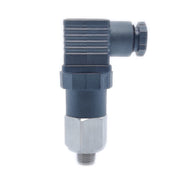Pressure sensors are critical components in various industries, including automotive, aerospace, and manufacturing. However, traditional pressure sensors often have issues with leakage, low durability, and temperature drift, which can lead to inaccurate readings and costly maintenance. To address these issues, the Glass Micro-Melt Pressure Sensor Core has been developed, offering a range of features that ensure accurate and reliable pressure readings.
The Glass Micro-Melt technology used in the sensor core is a revolutionary approach that uses stainless steel as the body structure and contacts the measuring medium. This means that the product has no sealing components or welding, eliminating the risk of internal sensor leakage. The circuit and induction components are on one side of the diaphragm, and the measuring medium is on the other side, in contact with stainless steel material. This design allows the product to measure various gases, liquids, and other media that are compatible with stainless steel.
One of the most significant advantages of the Glass Micro-Melt Pressure Sensor Core is its simple and easy-to-produce structure. Compared with the traditional diffused silicon core, it does not require silicon oil filling, which eliminates the risk of leakage. The sensor core is highly durable and can withstand high pressure and impact, making it ideal for use in industrial and mining environments. Its breaking pressure is up to 5 times while ceramic cores are 3 times.
Another advantage of the Glass Micro-Melt Pressure Sensor Core is its ability to adapt to extreme temperatures and environments. It has a temperature drift range of 0-120°C, which makes it suitable for use in cold environments and environments that generate water mist. Unlike other sensor cores, it does not suffer from pressure measurement inaccuracies caused by water vapor entering the core and damaging electronic components.
In conclusion, the Glass Micro-Melt Pressure Sensor Core is a game-changing technology that offers several advantages over traditional pressure sensors. Its stainless steel body structure, simple design, high durability, and adaptability to extreme environments make it ideal for use in various industries. Its ability to provide accurate and reliable pressure measurements without the risk of leakage or temperature drift makes it a must-have for anyone looking to improve their pressure sensing technology.



Leave a comment